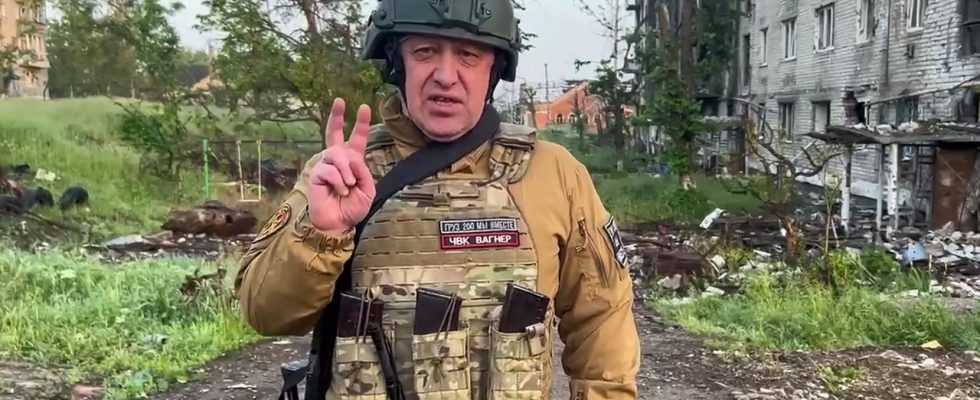analysis
Yevgeny Prigozhin’s career stands for many changes that Russia has undergone under Putin. Rich due to its proximity to power, then an important tool in pushing back the West – and in the end hardly controllable.
After the revolt of his Wagner troops against the Russian army leadership, many Russia experts had predicted that Yevgeny Prigozhin would not die a natural death. Behind the assumption was the observation that in the Putin system, members of the elite in the broadest sense had repeatedly died under dubious circumstances, many of them falling out of windows.
More than that, however, the assumption was based on the assessment that Russian President Vladimir Putin does not forgive those whom he considers traitors. And he had put that label on Prigozhin after the Wagner mercenaries had marched on Moscow in June.
With Putin up and to Moscow
Prigozhin’s revolt heralded the final chapter in a relationship that many observers have seen as symbolic of the trajectory Russia has taken under Putin. Prigozhin, a criminal with a long criminal record during the Soviet Union, is said to have met Putin in St. Petersburg in the 1990s, like so many others who later held leading, lucrative positions in the state.
In the wild years of Russian capitalism, Prigozhin also amassed wealth and influence. First in the catering industry in the city on the Neva, then, because Putin is said to have dined to his satisfaction in his restaurant, also in Moscow.
His catering company organized state banquets, supplied kindergartens, schools and the army – the nickname “Putin’s cook” was around at some point in the world and persisted even when Prigozhin was already active in other, more political fields.
New business areas
In the years when Putin’s Russia was increasingly turning away from the West and the president was working on restoring the dominance and sphere of influence of the Soviet Union, new business areas emerged for Prigozhin. He set up troll factories in St. Petersburg that were supposed to influence elections in numerous countries via the Internet.
An enterprise for international destabilization and covert military operations – for the Kremlin this was an advantageous construction, because it could always refuse any responsibility and involvement in Prigozhin’s actions.
The GRU military intelligence service was the inspiration when Prigozhin was involved in founding the Wagner mercenary group from around 2012. She played an important role in the destabilization of eastern Ukraine and the secession of Donbas. Better paid and equipped than the Russian army, more determined and brutal, the Wagner troops were also deployed in Syria from 2015.
Prigozhin’s mercenaries have now become a shadow army operating internationally and above all in Africa, which has always combined its operations – and serious war crimes – in Libya, Sudan, the Central African Republic, Mali and Burkina Faso with lucrative business. Wherever it supported faltering regimes against criticism from the West, it secured access to local raw materials as far as possible.
competitors in the system
The fact that the germ of the failure of Wagner and Prigoschin lay in these successes is another, almost bizarre, facet. Prigozhin became powerful and almost inevitably came into competition with other security services. During Russia’s war against Ukraine, Prigozhin recruited tens of thousands of serious criminals into prison camps and sent them to the front lines in the “meat grinder”.
It is doubtful that the Wagner troops actually achieved the military successes they claimed in the battle for Bachmut, for example. Prigozhin, a noisy salesman of himself, apparently felt powerful enough to publicly take on the country’s top military leadership – Defense Minister Sergei Shoigu and Chief of Staff Sergei Gerasimov – via his Telegram channel. It began with criticism of the soldiers’ equipment and supplies of ammunition, continued with criticism of the army leadership itself and ended in June with an attempt to arrest both of them during a visit to the Russian city of Rostov, which is close to the front.
Helpless President
Rarely during his term of office has Putin been more obviously helpless in the face of developments in his country than on the last weekend in June. The previously carefully balanced balance between the competing security services and economic interest groups – gone in one fell swoop. Instead, there were pictures of jubilation as the Wagner people took control of Rostov and then marched in the direction of Moscow without much resistance – but also without significant support.
And yet the belief that he could afford to attack Putin’s close confidante Shoigu was a fatal miscalculation on Prigozhin’s part, and the decision to send his mercenaries onto the M4 motorway was perhaps an act of helplessness. The revolt was called off, Prigozhin and the Wagner mercenaries moved to Belarus, and many observers predicted the imminent end of the once very useful Koch.
It was all the more confusing that Prigozhin was apparently able to travel around cheerfully in the weeks that followed, in Russia and a few days ago appeared again in drills, according to his own statement in Africa. It remains to be seen whether the crash of the Embraer plane in Tver Oblast is the fulfillment of the forecasts or not – anyway, Prigozhin’s death has not yet been confirmed. The mere guess will benefit Putin for now, because this kind of death fits into the revenge scheme the Russian president is cultivating.
The problem with the ultranationalists
The Prigozhin saga also illustrates one of the core problems of the Putin system in what may be its last act. Real danger threatens him above all from the camp of the ultra-nationalists, like Prigozhin himself was one.
The democratic opposition has long since been crushed, its leading representatives have been murdered, expelled or imprisoned. But Putin has opened the floodgates for extreme nationalism in Russia. That, too, flushed people like Prigozhin to the top. That they can become independent is a lesson that Putin will continue to have to deal with.

